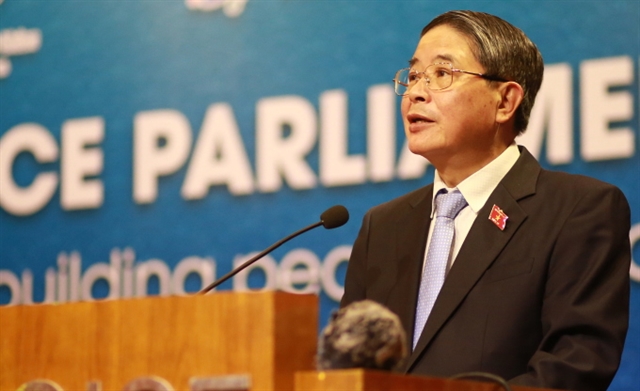 Society
Society


|
| Clever planning and proper goals are key to sustaining water security amid climate change, National Assembly deputy chairman Nguyễn Đức Hải tells the two-day Inter-Parliamentary Union’s Science for Peace Parliamentary Meeting on September 11. — Photo dangcongsan.vn |
BÌNH ĐỊNH — Water security needs strategic planning, specific goals, and feasible solutions amid climate change, deputy chairman of the National Assembly, Nguyễn Đức Hải, has said.
Speaking at the two-day Inter-Parliamentary Union (IPU) “Science for Peace” symposium that opened in Bình Định Province on Monday, he said scarcity due to scattered supply, modest storage and distribution systems, water pollution, and rise in demand are challenges facing the country’s water security.
Climate change has accelerated a rise in sea levels and increased the occurrence of natural disasters like floods, storms, droughts, and salinity, he said.
The quality and quantity of Vietnamese water sources depend mostly on exploitation, usage and conservation in countries where their headwaters lie, he pointed out.
“Sixty three per cent of the surface water in Việt Nam comes from foreign river bodies, and both the Cửu Long River and Hồng River have most of their basins – 90 per cent and 50 per cent – located outside the country.”
According to the World Bank, Vietnamese water use efficiency (WUE) is relatively low, at only US$2.37 per cubic metre compared to the global average of US$19.42.
WUE measures the grain yield or total biomass produced per unit of water consumed by crops.
The rates of water loss in domestic supply systems and irrigation are still high at 20-25 per cent and 30 percent.
Arising problems in water transportation and regulation, forest and aquaculture protection, as well as the country’s limited ability to build irrigation infrastructure, are also to blame.
Hải said a declined water security is also felt by many other nations around the world, and so it is necessary to have regional and international co-operation for strengthening it, minimising conflicts over water exploitation, and fostering sustainable water management.
The symposium being held at the International Centre for Interdisciplinary Science and Education (ICISE) with the theme “Water security and insecurity: Rebuilding peaceful coexistence with science,” is organised by the IPU, Rencontres du Vietnam (an official partner of UNESCO), the ICISE, the Department of Science and Technology, and Bình Định.
It is being attended by the secretary-general of the IPU, Martin Chungong, and his senior adviser, Mokhtar Omar, and over 60 scientists and young representatives from 18 countries, including Việt Nam.
There will be nine discussion sessions on topics like Earth observations for monitoring water sources, a human rights-based approach to peace and water security, innovating water treatment technology, enhancing water security through community science, science diplomacy, and scientific projections. — VNS




